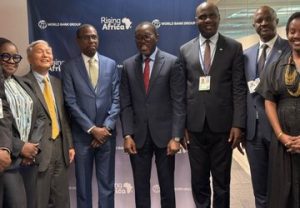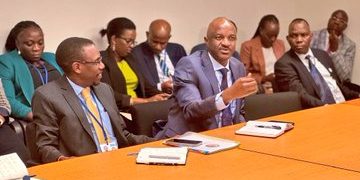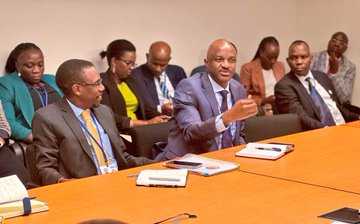The World Bank will disburse over $2 billion in new money to finance Uganda’s development over the next three financial years, bringing the total current investment to $4.9 billion.
This is contained in a statement released by the Permanent Secretary to the Treasury and Secretary to the Ministry of Finance, Planning, and Economic Development (PSST), Ramathan Ggoobi, detailing the outcomes of the 2025 International Monetary Fund (IMF) and World Bank (WB) Annual Meetings held in Washington, D.C.
The statement confirms a significant financial commitment to Uganda and highlights the country’s rising economic status.
These funds are earmarked for vital sectors, including “Roads and bridges, electricity transmission and last-mile distribution, building infrastructure in regional cities, schools, IT, agriculture, water and irrigation, export guarantee scheme, skilling, and social protection.”
IMF Praises Economic Stability
PSST Ggoobi noted strong interactions with the international bodies, which resulted in a positive update on Uganda’s economic status.
“The Fund has continued to rank Uganda among the fastest growing economies in Africa, and by extension in the world,” Ggoobi stated. “Our macroeconomy is stable.”
He also provided context on the global economic outlook shared by the IMF, which he attributed to private sector adaptability. “The International Monetary Fund (IMF) says the global economy has remained resilient despite the sweeping policy distortions by the United States (U.S.). Reason? Private sector adaptability.”
IMF ranked Uganda as one of the world’s fastest-growing economies, citing its strong growth in 2025. Specifically, the IMF ranked Uganda as the seventh fastest-growing economy globally for 2025. The economy has seen strong growth, with projections for the fiscal year at 6.3% and a further projection to reach 7% in the 2025-2026 fiscal year.

World Bank Shifts Focus to Job Creation
Ggoobi further detailed a philosophical shift at the World Bank Group under its current president, Ajay Banga, which aligns with Uganda’s focus on long-term growth.
“The President of the World Bank Group, Ajay Banga, has made the Bank start appreciating that development is not just about doing projects,” Ggoobi remarked. “World Bank (WB) is now focused more on unlocking the power of the private sector to create jobs.”
In line with this, the World Bank reaffirmed its commitment to the nation’s long-term economic strategy. “The World Bank has committed to support our tenfold growth strategy (investment in ATMS and their enablers),” the PSST confirmed. “The Fund is focused on helping us to continue maintaining a stable macroeconomy as we build a richer and more prosperous Uganda.”
Commitment to Reform
The statement also confirmed the conclusion of negotiations for a new Extended Credit Facility (ECF) program with the IMF following the recent elections. This program will be supported by key reforms aimed at securing fiscal stability and growth, including: increasing domestic revenue collection; improving budgeting to stamp out budget games and supplementary budgets; and further strengthening the financial sector.
Complementing the public sector funding, the International Finance Corporation (IFC) will provide patient capital to the private sector in critical areas such as minerals, renewable energy, agro-industrialisation, science, and innovation.
“With continued efforts,” Ggoobi concluded, “Uganda is well-positioned to leverage these partnerships to achieve rapid and sustainable economic growth and development.”











